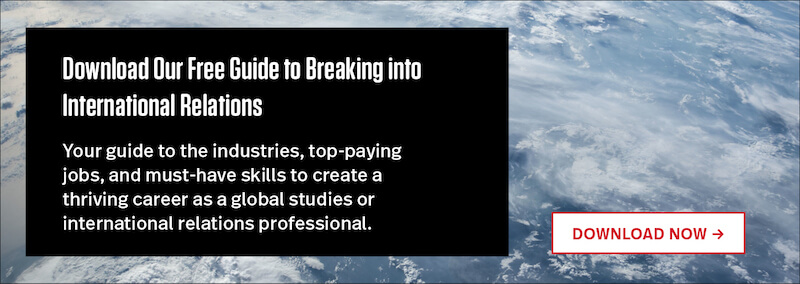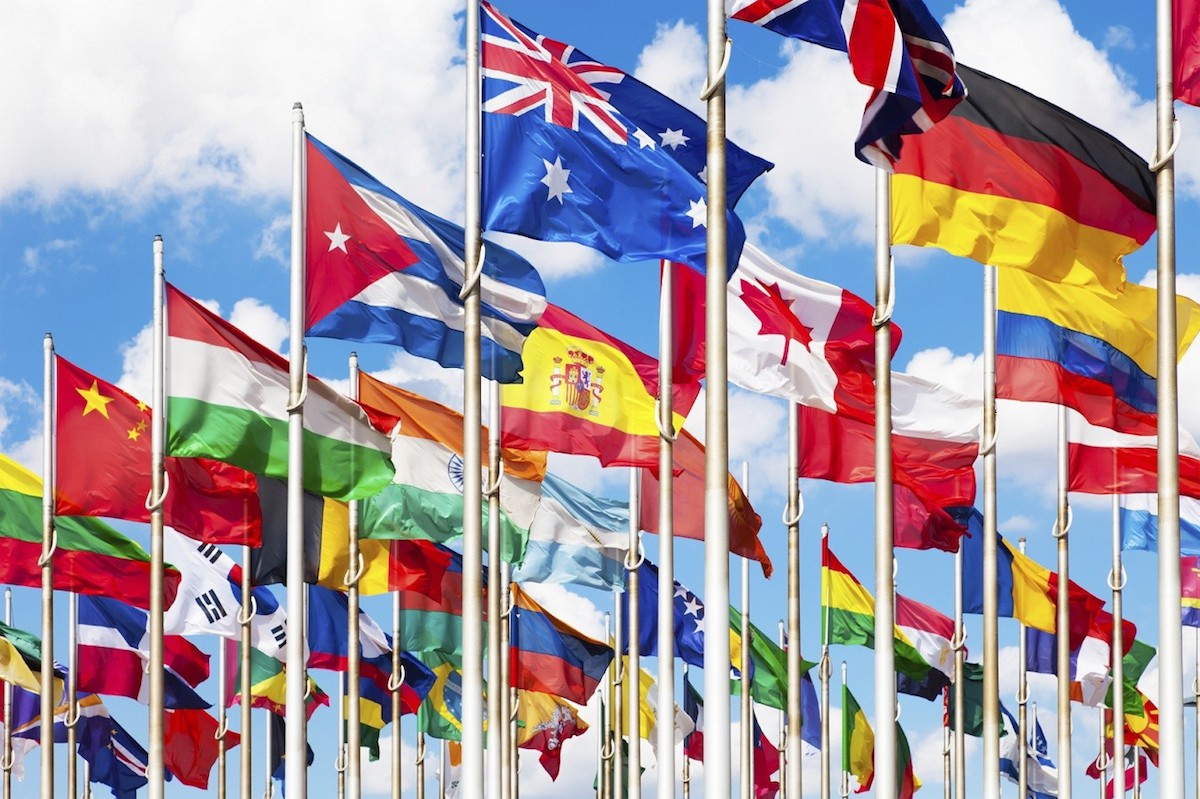An international business career enables you to travel around the world, interact with high-level clients, and shape organizational outcomes. It’s a career that cuts through complex intercultural issues—helping you make a lasting impact on global organizations all while positioning yourself for professional advancement.
With a growing world economy, many corporations have offices overseas and are looking for international business employees, such as management and financial analysts, marketing managers, HR professionals, executives, and economists. These companies include IBM, General Electric, Apple, General Motors, Amazon, and Facebook.
“You are well-positioned for a multitude of careers by being able to appreciate the dynamics of how to work cross-culturally,” says Gail Marcus, adjunct professor in Northeastern’s Master of Science in Global Studies and International Relations program. “By studying for a career in international business, you are preparing yourself for the world of the future.”
Download Our Free Guide to Breaking into Global Studies and International Relations
A guide for what you need to know to prepare for, and work in, today’s globalized world.
If you’re looking to enter international business, keep in mind that the majority of global roles prefer or require an advanced degree. According to a 2017 report from Burning Glass Labor Insight, 57 percent of employers prefer or require a graduate degree for positions within international relations.
A graduate degree, therefore, may be the best path to advance your career, whether you’re looking to earn a promotion, boost your income, enhance your professional network, or change careers. If you’re considering a career in international business, here are seven popular roles an advanced global studies or international business degree can provide.
In-Demand International Business Careers
1. Management Analyst
2017 Median Pay: $82,450
Estimated Job Growth through 2026: 14 percent
Management analysts, also known as consultants, create new ways of improving an organization’s efficiency. They advise upper management on how to enhance company performance by solving organizational problems, such as evaluating a new market expansion program or adapting to a different operations strategy.
In particular, global analysts help companies find solutions to issues regarding foreign markets. They work with companies on specific projects within a wide range of areas on a global scale, including management, market research, corporate strategy, finance, and information technology.
An international analyst’s responsibilities may also involve:
- Gathering and analyzing company data, such as revenue, expenditure, and employment reports, across international divisions
- Determining how to lower company overhead, such as supply expenses, financial expenditures, and global staffing
- Interviewing management overseas to determine the best methods and resources needed to resolve company issues on an international scale
- Recommending new systems, practices, and organizational changes to be implemented within each global office
- Working with managers to ensure that changes are being implemented effectively
Analysts work in both the public and private sector, including the government, nonprofits, small and medium-sized businesses, and large corporations. They may be freelancers or employed by consulting agencies. The largest international consultancies, such as Deloitte and PricewaterhouseCoopers, boast hundreds of thousands of employees.
“Consultants have to look at problems from a wide range of perspectives,” Marcus says. “They access issues objectively and distill facts by being able to analyze problems and trying to understand the root cause. They also need to have strong interpersonal skills, as consulting is as much about the analytical work as it is about building relationships.”
2. Marketing Manager
2017 Median Pay: $129,380
Estimated Job Growth through 2026: 10 percent
Marketing managers must balance a competitive business strategy with a creative vision. They often work with art directors, sales executives, product developers, public relations managers, and other employees to create engaging marketing campaigns.
In addition, international marketing managers are responsible for increasing global sales. They must be aware of global market trends and develop products that meet demand worldwide.
Global marketing managers’ duties also include:
- Overseeing budgets, contracts, marketing plans, and advertising media with management and team members across international markets
- Planning marketing campaigns to reach target markets, including specific age, gender, income, and education demographics, based on global needs
- Initiating market research and analyzing findings to determine customer opportunities
- Examining the international demand for company products and services while studying what their competition offers
- Developing pricing strategies for a company’s products or services
- Ensuring consistent brand tone and messaging across all platforms
- Leading content generation and production across digital and print media
3. Executive
2017 Median Pay: $104,700
Estimated Job Growth through 2026: 8 percent
Executives plan organizational strategies that align with their company’s mission while managing employees and resources, with global executives overseeing company goals, policies, and procedures across international divisions. Their responsibilities may include:
- Directing operational activities to create in-demand global products and services
- Discussing company performance with other executives, staff, and board members worldwide
- Negotiating and signing off on contractual agreements
- Assigning department heads and managers overseas
- Analyzing company reports, including financial and sales data
- Identifying areas to reduce costs, increase revenue, and improve company performance
Executives can include chief executive officers, chief operating officers, and general managers, whose responsibilities vary based on the size of their company. In general, the larger the company, the broader the executive’s responsibilities. They can be found in every industry, including education, project management, and data analytics.
Executives need strong decision-making, management, and problem-solving skills to handle their organization’s needs. As company leaders, executives are effective multi-taskers, managing numerous projects while making sure their work is completed under deadline.
4. Human Resources Manager
2017 Median Pay: $110,120
Estimated Job Growth through 2026: 9 percent
Human resources managers recruit and hire employees, discuss organizational objectives with executives, and serve as a liaison between top management and employees.
International HR managers manage workforce diversity, legal restrictions, and the relationship between training and professional development on a global scale. They align legal compliance with labor and tax laws worldwide. In addition, an international HR manager’s duties comprise of:
- Aligning management with its employees to support global organizational development and culture
- Coordinating and directing employee benefits programs across foreign divisions
- Working with other managers on sensitive HR issues in accordance with national laws, such as equal employment opportunity
- Handling staffing issues, including disciplinary action, productivity, training, compliance, payroll, and outsourcing
- Supervising international contractors, support staff, and employees
- Overseeing company retention procedures and ensuring a supportive, collaborative company culture
HR managers also enhance their company’s efficiency by identifying ways to keep employees motivated. For example, they might notice a decline in a department’s productivity and, as a result, recommend several strategies to keep employees motivated in order to maintain employee happiness and performance.
5. Financial Analyst
2017 Median Pay: $84,300
Estimated Job Growth through 2026: 11 percent
Financial analysts produce reports, guide investment activities, and develop strategic planning to support the long-term financial goals of a company. They combine the technical and communication skills needed to enhance their organization’s bottom line.
As investing becomes more international, global organizations want financial analysts who understand the region’s language, culture, environment, and political background. International analysts must understand how global currencies, diplomacy, and worldwide stock exchanges affect their company’s bottom line.
Global financial analysts may also focus on:
- Recommending foreign investments and portfolios
- Analyzing current and historical financial data to determine global market trends
- Studying international economic and business patterns
- Examining their organization’s financial records across global divisions
- Preparing financial reports and presentations to review with management
- Evaluating their company’s financial decisions to help enhance company performance
- Listening to and understanding their clients’ needs, effectively communicating their recommendations to enhance client outcomes.
Financial analysts typically focus on patterns affecting a specific industry, geographical area, or particular product. For example, an analyst may focus on the healthcare industry, a region such as the United Kingdom, or the foreign stock exchange. They understand how different regulations, policies, and political and economic trends can influence individual investments and portfolios.
6. Economist
2017 Median Pay: $102,490
Estimated Job Growth through 2026: 6 percent
Economists study the production and circulation of resources, goods, and services by analyzing data, developing theories, and evaluating economic issues. They work in a variety of fields, including education, development, and healthcare.
International economists analyze global issues, such as international consumer demand for certain products or services, to help increase a company’s profits. Some economists may work for research institutes, while others work for major international organizations, such as the World Bank, International Monetary Fund, and United Nations. Many economists work for federal, state, and local governments, analyzing data about their country’s economy, including employment, pricing, productivity, wages, and other types of national data.
Global economists’ responsibilities also include:
- Conducting surveys and examining international data using statistical analysis, database management programs, and other complex mathematical tools
- Studying and forecasting global market trends
- Creating reports, tables, and charts representing their findings
- Designing policies and making recommendations to solve economic issues worldwide
Economists project spending needs and notify policymakers on the economic impact of current laws and regulations. Given their significance, economists’ findings are frequently published in newspapers and journal articles.
7. Policy Analyst
Median Pay: $115,110
Number of Jobs in 2016: 7,300
Policy analysts study complex problems and recommend solutions for a wide range of political issues, from homeland security to healthcare and environmental policy. They examine governments, political trends, legal systems, and other related issues, and their research helps inform public policy.
Global policy analysts typically focusonn one or more areas pertaining to international relations, such as international trade, global business policies, national defense, international economics, and foreign law. Their duties include:
- Evaluating outcomes related to proposed regulations, legislation, or resources on a global scale
- Monitoring international events and policy decisions
- Developing and testing theories using statistical analysis and other tools
- Gathering and examining data from various sources, such as election results and public opinion surveys
- Identifying key trends, policies, and strategies worldwide
In addition, analysts must have strong written, public speaking, and interpersonal skills. They can work for governmental agencies or multinational corporations, often writing reports, publishing articles, and giving presentations to government officials and business executives.
From consultant to marketing manager to economist, professionals who enter international business open themselves up to roles shaping organizational strategy, directing global policy, and managing corporations.
“There are a number of different paths people can take,” Marcus says. “Find a career based on what resonates with you, what matches your skill set, and what you excel at.”
To find out more about advancing your international business career, download our free guide below.

Editor’s note: This article was originally published in October 2017. It has been updated for accuracy.






Related Articles
How You Can Use Geographic Information Technology
5 Reasons to Study International Relations and Diplomacy
Master’s Lands Alum Role with the Dept. of Homeland Security